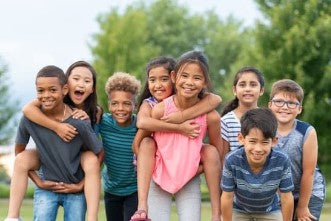
It’s never too early to teach your kids about fatphobia
Shelby KretzShare
Why we need to go beyond body positivity and neutrality
By Gabby Cushman
I have a distinct memory from when I was in the fifth grade, sitting at a lunch table with a group of friends. During an everyday conversation about school, one of the girls exclaims out of nowhere:
“Gabby, I think you’re the fattest at the table.”
She said it simply with a smile as if it was a plain observation. My other friends awkwardly looked back and forth at the two of us, waiting to see what I said. I couldn’t muster a single word. I don’t remember noticing much about my body size before this moment. But after this comment, I looked around and noticed that all my friends were smaller than me.
I’m sure there had been seeds planted in my head from an even younger age. My favorite female celebrities talking about skipping meals to fit into their beautiful red carpet ensembles. A viral YouTube video where the joke was just the size of someone’s body. A character in a Disney Channel movie asking if their shirt made them look fat. Fatphobia had always been present, slowly altering my view of what was a “good” body. Now that it had been directed at me, I noticed it more than ever.
When I was 12, I started sucking in my stomach whenever someone took a picture of me. When I was 14, I wondered why my thighs touched together when my friends had thigh gaps. When I was 15, I noticed when my dance teacher gave my friend and me full-length tank tops to wear instead of the crop tops the rest of the dancers wore. When I was 16, I dressed in oversized bulky clothes to avoid my male peers commenting on my body. As an adult, I still have to fight unhealthy thoughts that enter my mind when I see my appearance.
I and all of my peers were conditioned to believe that being fat was one of the worst things that could happen to us. It was such an intense fear in our minds that we projected it onto others to make ourselves feel more secure. And this vicious cycle of fatphobia is not just an issue with children- far from it. I’ve found that as an adult, this fear seems even more widespread than it was when I was a kid. If I see a post by someone who considers themselves fat, plus-sized, or mid-sized on my social media timeline, I know that other adults will be the ones filling their comments with vile critiques of their bodies and fake cases of “concern” for their health. And that poses the question:
Where do we think children learn this rhetoric from?
It’s our jobs as adults to ensure that 1.) our children form healthy relationships with their bodies, and 2.) they also recognize and denounce fatphobic rhetoric. We’ve discussed body positivity and neutrality in previous blogs, but those topics go hand-in-hand with fatphobia. In fact, both movements were created by fat people to have a space where their bodies were celebrated and loved. When we teach our children to love or accept their bodies, we should also teach them that being fat isn’t bad. That the word “fat” itself isn’t a bad word. That the dominant groups in our society decided that fat people should be shamed and treated differently because they didn’t meet their made-up beauty standards.
This can be a difficult conversation to have with our little ones because it’s easy for us to struggle with our own fatphobic thoughts and beliefs that have been deeply ingrained throughout our lives. Recently I gained weight and had to go up a couple of sizes in clothes. Going into fitting rooms to try on jeans felt mortifying and shameful. When I recognized that I was feeling this way, I asked myself: “Why? Why am I scared of gaining weight or being seen as fat? Is being fat really a bad thing, or is it something the world told me is a bad thing?”
It’s not an overnight change. I have to have this conversation with myself often. It may take time for you to rework this thought pattern too. But if we can teach our little ones to fight fatphobia and grow up to be compassionate and accepting individuals, we can work to change how our society views people’s bodies as a whole. So a ten-year-old like me, when faced with an implied negative comment about their body, can feel confident in responding:
“Well, I guess my body is different from yours. But why does that matter?”
To join our community of changemakers bringing social justice education to kids everywhere, sign up for the LJL newsletter here.
